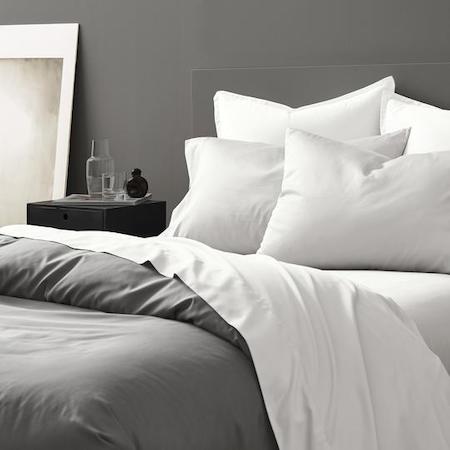Direct to Consumer vs. Retail
Many of the top-rated bedding manufacturers only offer their products online, or in a few company owned brick-and-mortar retail locations. This direct to consumer model has some advantages, primarily that it allows companies to sell high-quality products at lower prices. By cutting out the middleman and their overhead costs, direct to consumer retailers can reduce prices, sometimes offering higher quality products than those offered by traditional retailers at the same price point.
That doesn’t mean that you can’t find high-quality, affordable bedding at retail stores like Walmart, Target, or Bed Bath & Beyond. In fact, visiting those stores gives you the opportunity to see and touch different types of bedding so you can learn what you prefer.
That being said, when you buy from a retail store, it may be more challenging to know exactly what you are buying, since direct to consumer bedding companies tend to be more transparent about their materials and processes.
Before you shop, then, do some research to learn exactly what different terms mean and what to look for so you make the best decision for your tastes and needs.
Quality Indicators for Bedding Brands
Buying anything online can be tricky, since you aren’t able to see the product and gauge the quality for yourself. Remember that price isn’t always an indicator of quality, and you should evaluate the bedding using a few clues.
- Materials. Cotton is the most common material used in high quality sheets. In particular, look for cotton listed as long-staple, pima, Supima, or Egyptian cotton. Short staple or upland cotton is the lowest quality cotton, and tends to be coarser than other types. Linen is another common material used by online bedding brands. Look for linen made from 100 percent flax, and expect it to be a bit coarser and susceptible to wrinkling than cotton.
- Construction. High quality bedding includes features like double-stitched hems, secure closures, elastic around the entire flat sheet, and labeled short and long sides.
- Ease of care. Bedding should be easy to wash, without a great deal of special care or products required. Ideally, it should improve with time and washing, not fall apart or fade.
- Warranties and Return Policies. Quality bedding manufacturers stand behind their products, offering generous warranty and/or return periods.
- Reviews. What are others saying about the bedding? Look for reviews that speak to the quality of the products and how well they hold up, how comfortable they are for sleeping, and the breathability of material.
Types of Bedding Products
To help you make sense of your bedding options and what to look for when shopping, keep these tips in mind.
Sheets, Duvet Covers & Pillow Cases
Whether you prefer to sleep with both a top and fitted sheet, or just the bottom sheet, you want sheets that are soft, help you remain at a comfortable temperature, and are easy to clean. Choose sheets that are deep enough to fit your mattress, with a thread count between 100 (for linen) and 600 (for sateen). Anything higher than 600 thread count is not likely to be any better quality than other options, so don’t spend more for exceptionally high thread counts.
Pillows
Spending a bit more on a quality pillow can make a measurable difference in how well you sleep. Pillows should be durable and hold their shape without getting flat or lumpy, and have a breathable cover that won’t get too hot while you sleep. Choose a pillow based on your preferred sleep position to avoid pain and discomfort; for example, side sleepers need pillows with a higher loft than stomach sleepers.
Comforters & Duvets
Technically speaking, a comforter is a single-piece bed cover stuffed with natural or synthetic materials, whereas a duvet includes an insert and a cover. However, comforters can be used as duvet inserts. Regardless of which option you choose, selecting a bed cover involves many of the same considerations as buying sheets. Choose a material that’s durable and comfortable, with a fill that helps you maintain a comfortable sleeping temperature. Pay close attention to the cleaning instructions. Duvet covers and some comforters can be machine washed, but duvet inserts typically need to be dry cleaned.
Mattress Protectors and Pads
Mattress protectors and pads offer protection against spills and other damage to your mattress, and in some cases, an extra comfort layer. When looking at mattress covers and pads, choose one that is silent (some waterproof models can be noisy) and won’t affect the breathability of your mattress and make it too hot. If you are concerned about allergens and bed bugs, consider a mattress encasement, which covers all sides of the mattress.




